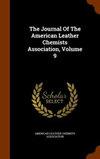Retanning Performance of Carboxymethyl Starch and Its Effects on Dyeing
IF 0.5
4区 工程技术
Q4 CHEMISTRY, APPLIED
Journal of The American Leather Chemists Association
Pub Date : 2022-02-01
DOI:10.34314/jalca.v117i2.4731
引用次数: 0
Abstract
The tanning characteristics of starch samples modified by different methods were investigated in our previous studies. In this study, utilization of modified starch in leather making as a retanning agent and its effect on dyeing process have been investigated. For this purpose, the molecular size of native corn starch was reduced by H2O2 oxidation and then carboxymethylated. A series of analyses (water solubility, degree of substitution, Fourier Transform Infrared Spectroscopy, Proton and Carbon Nuclear Magnetic Resonance Spectroscopy) were carried out for characterization. Then, carboxymethyl starches were used in retanning processes to be 3, 5 and 10% based on leather weight and the shrinkage temperatures and filling coefficients of the leathers were determined. Acid and metal complex dyestuffs were used in dyeing processes and the effect of carboxymethyl starch on dyeing was also investigated by examining dye consumption, dry and wet rubbing fastness and color of the leathers. From the results it was concluded that carboxymethyl starch showed a noticeable solo performance in terms of filling property and shrinking temperature without any considerable adverse effect on dyeing.羧甲基淀粉复鞣性能及其对染色的影响
对不同方法改性淀粉样品的鞣制特性进行了研究。研究了变性淀粉在制革中的复鞣作用及其对染色工艺的影响。为此,将天然玉米淀粉通过H2O2氧化还原,然后进行羧甲基化处理。通过一系列的分析(水溶性、取代度、傅里叶变换红外光谱、质子和碳核磁共振光谱)对其进行表征。然后,根据革重的不同,分别在复鞣过程中添加3、5、10%的羧甲基淀粉,确定革的收缩温度和填充系数。采用酸性和金属络合染料对皮革进行染色,并通过测定染料用量、干湿摩擦牢度和皮革颜色,考察羧甲基淀粉对皮革染色的影响。结果表明,羧甲基淀粉在填充性能和收缩温度方面表现出明显的单一性,对染色没有明显的不利影响。
本文章由计算机程序翻译,如有差异,请以英文原文为准。
求助全文
约1分钟内获得全文
求助全文
来源期刊

Journal of The American Leather Chemists Association
工程技术-材料科学:纺织
CiteScore
1.30
自引率
33.30%
发文量
29
审稿时长
3 months
期刊介绍:
The Journal of the American Leather Chemists Association publishes manuscripts on all aspects of leather science, engineering, technology, and economics, and will consider related subjects that address concerns of the industry. Examples: hide/skin quality or utilization, leather production methods/equipment, tanning materials/leather chemicals, new and improved leathers, collagen studies, leather by-products, impacts of changes in leather products industries, process efficiency, sustainability, regulatory, safety, environmental, tannery waste management and industry economics.
 求助内容:
求助内容: 应助结果提醒方式:
应助结果提醒方式:


